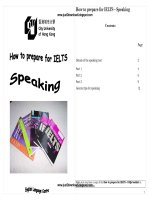how to pass the ielts speaking module
Bạn đang xem bản rút gọn của tài liệu. Xem và tải ngay bản đầy đủ của tài liệu tại đây (1.5 MB, 41 trang )
Learn From The Examiner
How to Pass the
IELTS Speaking
Module
April
)ELTS Blog com
All rights reserved No part of this book may be reproduced in any form or by any means or
stored in a database or retrieval system without prior permission of the author Making
copies of any part of this book for any purpose other than your own personal use is a
violation of )nternational Copyright Laws
Limits of Liability Disclaimer of Warranty
The author and publisher of this book and the accompanying materials have used their best
efforts in preparing this program The author and publisher make no representation or
warranties with respect to accuracy applicability fitness or completeness of this program
They disclaim any warranties expressed or implied merchantability or fitness for any
particular purpose The author and the publisher shall in no event be held liable for any
loss or other damages including but not limited to special incidental consequential or
other damages As always advice of competent professionals should be sought
This manual contains material protected under )nternational Copyright Laws and Treaties
Any unauthorized reprint or use of this material is prohibited
2
© IELTS-Blog.com - All Rights Reserved
Web:
Table of Contents
)ntroduction
Part of the )ELTS Speaking Module Explained
Part of the )ELTS Speaking Module Explained
Part of the )ELTS Speaking Module Explained
The most common mistakes made by )ELTS candidates in the )ELTS
Speaking Exam and how to avoid them
3
© IELTS-Blog.com - All Rights Reserved
Web:
1. Introduction
This book is designed to help )ELTS candidates raise their )ELTS Speaking scores by an
entire band enabling them to get the mark they require for their future life
This document has been put together by a former )ELTS Speaking Examiner who has
experience of interviewing many thousands of )ELTS candidates and has been thereby able
to identify the simple errors which the majority of candidates make again and again
After finishing reading this book you will be in a strong position to prepare yourself to
succeed in the )ELTS Speaking exam
Of course if you combine the knowledge and wisdom inside this book with completing an
online audio course at )ELTS Blog com you will greatly increase the effectiveness of this
book in helping to raise your band score and will be almost certain to raise your overall
band score for the )ELTS speaking module
4
© IELTS-Blog.com - All Rights Reserved
Web:
Overview of the Test
The )ELTS Speaking Module tests your ability to produce sentences in English in response
to questions asked )t is a test of your ability to create sentences in English so to this extent
if you practise set answer structures you will greatly increase the marks which you will
receive for your test
The test lasts between
minutes The length of the test depends upon how long the
candidate wants to speak for There are parts and each part has a maximum of minutes
available
)t is in your interests to speak for as long as possible in order to demonstrate your English
language skills So this book shows you how to manage the time in each of the three parts
of test so that you have more chance to impress the examiner with practised sentence
structures but not memorized scripts
So here is a summary of the Speaking Test
5
© IELTS-Blog.com - All Rights Reserved
Web:
Here is an Overview of the Marking Criteria
)n the speaking test you will be marked on your English language ability in four different
areas These are
Style and ability to express yourself in English
Vocabulary range and accuracy
Grammatical range and ability
Pronunciation
All the above can be greatly improved through practising prewritten answers to the
speaking questions shown below
2. Part 1 of the Speaking Test
How to Answer the Introductory Questions in Part 1 of the Speaking Test
The introductory questions are asked at the beginning of Part of the Speaking test for two
reasons
To confirm the identity of the Candidate for Examiner and for the DRD recording
DRD means Digital Recording Device
To provide some simple warm up questions to help the candidate to start thinking
in English
Tip )t is important to remember that this part of the test is not rated - so there is no need
to try and provide good answers You just need to show that you understand the questions
asked by the examiner and can provide simple yet effective answers in grammatically and
stylistically correct English
You should also keep your answers short so that you will have more time for the rated
questions in part The more time you spend answering the introductory questions, the less
time you will have to show your English ability in the rated section of part 1.
6
© IELTS-Blog.com - All Rights Reserved
Web:
The Introductory questions:
7
© IELTS-Blog.com - All Rights Reserved
Web:
Below is an example of how to answer the introductory questions:
8
© IELTS-Blog.com - All Rights Reserved
Web:
Explanation of the appropriate answers to the introductory questions
Explanation: You are being asked a simple question to confirm your identity So you
only need to confirm your full name
Explanation: Examiners are unlikely to use your name in the interview so do not worry
about your name being possibly difficult for foreigners to pronounce Simply give the name
that your friends and family call you by
9
© IELTS-Blog.com - All Rights Reserved
Web:
Explanation: You are being asked a simple question to find out which part of your
country you are from So you only need to confirm your home town or province and where
it is in your country
Explanation: The examiner is asking to see your identification document either your
national )dentification Card or your Passport so you need to have this ready placed on the
table in front of you to give to the examiner to look at.
10
© IELTS-Blog.com - All Rights Reserved
Web:
Examples of bad answers to the Part 1 introductory Questions
Explanation: You are being asked a simple question to confirm your identity So you
only need to confirm your full name You are not being asked to start a conversation
Explanation: You are being asked a simple question to confirm your identity for the
Digital Recording Device So you only need to confirm your full name The examiner is
already in your country and probably also lives in your country so does not need
welcoming Also this answer is unprofessional you should avoid being emotional in the
Speaking test
Explanation: You are being asked a simple question to confirm your identity So you
only need to confirm your full name You are not being asked to start a conversation
11
© IELTS-Blog.com - All Rights Reserved
Web:
Explanation: You are being asked a simple question to confirm your identity So you
only need to confirm your full name You are not being asked to start a conversation
Explanation: You are being asked a simple question to confirm your identity So you
only need to confirm your full name You are not being asked to start a conversation )t is
also unprofessional to talk about how the examiner looks
Explanation: You are being asked a simple question to confirm your identity for the
DRD recording So you only need to confirm your full name You do not need to provide any
additional information and will make the examiner s job more difficult as you have
answered questions in Part
12
© IELTS-Blog.com - All Rights Reserved
Web:
Part 1. Topic Questions:
)n Part after the introductory questions you will be asked questions based upon
questions about your daily life Each topic has three questions to answer on that topic
As the examiner is allowed
minutes for part this means that after the introduction
there is approximately minute for each topic therefore you should allow this time limit
to allow time to answer each question and so earn maximum possible marks
Tip: You should allow seconds to answer each question to give yourself enough time to
answer all the questions and to show that you have the required range of English ability
Each of the three topic questions which you will be asked will use the same following
format
Part 1 topic question format:
13
© IELTS-Blog.com - All Rights Reserved
Web:
And here is a sample topic question:
On the next pages is a sample answer followed by explanations as to why the questions
were answered in that way
14
© IELTS-Blog.com - All Rights Reserved
Web:
15
© IELTS-Blog.com - All Rights Reserved
Web:
16
© IELTS-Blog.com - All Rights Reserved
Web:
Explanation: The one thing that you must not do in answering a question is to give a
one word answer So the above answers avoid the first potential way to lose marks
The answers are also second long which is long enough to answer the question in detail
and at the same time short enough to stay within the recommended minute for each
topic This then allows the examiner to ask all the topic questions and so gives the
candidate the opportunity to get more marks
)f you plan to answer three second sentences for each question in part you will have
enough time to answer all the questions To recap
A timing strategy for answering part topic questions
Review of Part 1 of the Speaking test
17
© IELTS-Blog.com - All Rights Reserved
Web:
3. Part 2 of the Speaking Test
How to Answer Part 2 of the Speaking Test
Part two of the Speaking Test is where you are given a topic to talk about for minutes
The topic can be on any subject and you are given one minute to prepare for it including
making notes if necessary
After speaking for one to two minutes you must speak for a minimum of minute and a
maximum of two minutes the examiner will stop you and ask you a general follow up
question on the topic which should be answered briefly ideally seconds
Tip: You should try and speak for the maximum minutes permitted to maximise your
chance of being highly rated in your ability to present a topic in English
The timetable for Part 2 looks like this
18
© IELTS-Blog.com - All Rights Reserved
Web:
19
© IELTS-Blog.com - All Rights Reserved
Web:
And here are some topic examples not actual test materials as they are protected by
copyright law
Question 1
Question
type
Main
Subject
Follow up
Question
Question
Describe a shop that you like to visit )n your talk mention the
following
• Where the shop is
• What the shop specializes in
• Why you like to shop there
Do your friends also like to visit this shop
Question 2
Question
type
Main
Subject
Follow up
Question
Question
Describe a place that you enjoyed visiting recently )n your talk
mention the following
• Where the place is
• Why you visited the place
• What you liked about the place
)s this a popular place to visit
Question 3
Question
type
Main
Subject
Question
Follow up
Question
)sthisapopularjobinyourcountry
Describeajobthatinterestedyou
ã Whatthejobis
ã Whatthejobinvolves
ã Whythisjobinterestsyou
20
â IELTS-Blog.com - All Rights Reserved
Web:









